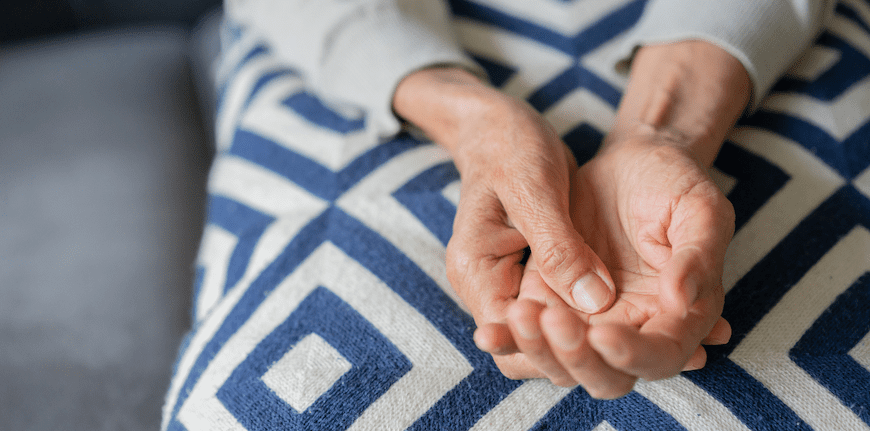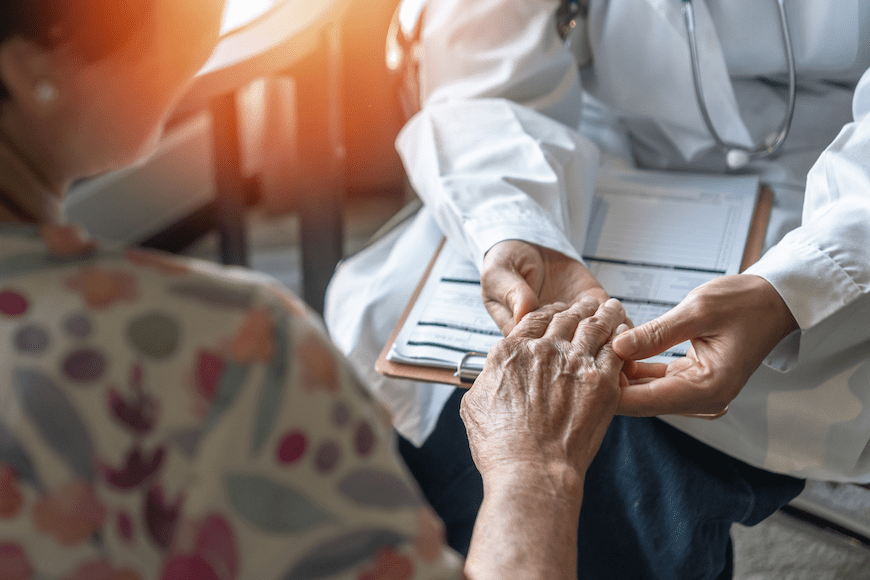“Not today, Parkinson’s!”
With fists raised, this is the mantra—a battle cry, really—emanating from the members of Club Parkinson’s at the end of their group’s weekly empowerment sessions.
“It’s very powerful to hear a room full of people shout this out at the end of each meeting,” said Connie Urbanek, a physical therapist assistant and co-founder of the club.
Join the Club
Urbanek and occupational therapist, Shana Gatschet founded the club in 2021 as a wellness and education center to help Parkinson’s (PD) patients manage their disease and improve their quality of life. The club is located on the campus of Wichita State University in Kansas.
The club offers classes Monday through Friday in everything from yoga to Nordic walking to falls prevention to speech therapy. In much of their fitness training, they follow a protocol called PWR!Moves. Short for Parkinson Wellness Recovery, the PWR!Moves technique is designed to target skills known to deteriorate in people with PD.
”Parkinson’s can feel like a very lonely disease, and in this place, I am not alone. Just knowing there are others with Parkinson’s helps me keep trying,” said Ray Santee, 72, who was diagnosed with PD in 2015 and joined the club about a year ago.
Recognition of OFF Episodes in PD
Effective Treatment for Parkinson’s Psychosis
As valuable as that kind of physical work can be in helping to improve mobility and balance, the weekly empowerment group meetings get to the heart of one of the most critical needs for patients afflicted with this neurodegenerative disease–social isolation.
Better Together
“It’s such a lonely disease,” said Urbanek. “A lot of people self isolated and did even more so during the pandemic. They don’t want to be out in public because they think they’re going to be judged.”
Not at Club Parkinson’s. And certainly not in the professionally moderated empowerment class, which meets in a room in Wichita State’s Heskett Center every Friday morning for an hour.
“We take on different topics,” said Urbanek. “We’ve talked about grief, about coping skills, about things as simple as ‘how do you travel when you have PD.’”
Each of the classes typically attract about 20 participants with a total of about 60 people participating in the club’s support groups. Some members are newly diagnosed. Others have been managing the disease for years. There is also a separate class for caregivers of PD patients.
It’s in this kind of setting that those with PD can really talk about some of their day-to-day issues, and know that they’ve got a sympathetic ear. This is a group that understands, because they’re experiencing the very same challenges and frustrations.
“I want to thank the founders of Club Parkinson’s for having the vision to realize that not only was the physical exercise portion of the club important but also that attention needed to be paid to members’ emotional health as well,” said the empowerment group’s moderator, Susan Bray. “It’s what makes Club Parkinson’s so special.”
Bray, an associate professor at Wichita State and a Licensed Marital and Family Therapist, said that the experience of working with the group has been gratifying, as well as eye-opening. “I think I gain as much or more by leading the group than the members,” she admitted.
Among other things, club members like the fact that they don’t have to explain themselves or the disease. One told Urbanek about the difficulties she was having while exercising at the local YMCA.
“She told me, ‘people see I’m shaking, and they come over to help me, or ask what’s wrong, so I have to stop and explain to them that, while I appreciate their concern, I have Parkinson’s.’”
At Club Parkinson’s, no one has to ask and most certainly no one is judging. “Here, she said she just feels fully accepted and one hundred percent comfortable,” Urbanek said.
Backed by Research
These types of programs are important. According to data published in the Lancet in 2021, PD is the fastest growing neurological disease, surpassing Alzheimer’s disease. In the time frame of 1990 to 2015, the prevalence of PD has more than doubled. It will double again by 2040 if predictions hold.
While difficult to measure, research on the value of social interaction for PD patients suggests that interventions to address the issue of social isolation and loneliness are particularly vital for those affected by what has been called The Parkinson’s Pandemic.
“Loneliness has been shown to affect cognitive processing and can cause a hyper-vigilance that can predispose to anxiety.” wrote UCLA neurologist Indu Subramanian, MD, lead author of a 2020 study in the journal npj Parkinson’s Disease that found social isolation during the pandemic was associated with worsened PD severity and decrease in quality of life. This, in turn, can have adverse effects on many aspects of their lives, including sleep.
“Loneliness can disrupt circadian rhythms and lead to more fragmented sleep,” wrote Subramanian. “This sleep quality disruption can result in fatigue and increased irritability.”
Isolation among PD patients can have very real and dangerous effects. A 2021 study in the journal BMC Neurology found that during the depths of the COVID pandemic isolation led to worsening balance and an increased risk of falls, not to mention increased BMI.
Social connection may be important beyond falls and sleep quality. A 2019 study conducted among PD patients in five Latin American countries found that social support—followed by satisfaction with life and their personal financial situation—was the most important factor for influencing quality of life with PD.
“Interventions to foster positive living with Parkinson’s disease in clinical practice should integrate strategies to tackle and prevent loneliness,” concluded the authors in the paper, which was published in the Journal of Clinical Nursing.
Keeping it Positive
No one seems lonely at Club Parkinson’s. And the empowerment class is all about encouraging positivity. It’s obvious, said Urbanek, as soon as you walk in the room.
“You would think you’d be talking to a group of PD patients and that it might be all doom and gloom,” she said. “That’s not the case. They have such positive attitudes. There are times when it’s very serious, but there’s a lot of laughter, too. And there’s always a lot of understanding and a lot of support.”
Peggy Cate, 83, the caregiver to her husband who was diagnosed with PD four years ago, agreed. “I look forward to our Empowerment Group. It helps me to cope better as I hear about what others are experiencing. This in turn helps me to be able to deal with issues that come up,” she said.
Strength and empowerment are messages that resonate with the club’s members. That’s why it’s not surprising that one of them coined the defiant “Not Today Parkinson’s!” cheer that punctuates the end of each class. “It’s amazing how much they lift each other up,” Urbanek said.



